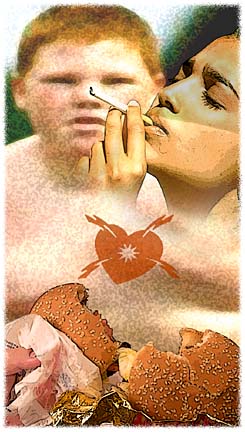
PHOTO ILLUSTRATION BY DAVE SWANN / DSWANN@STARBULLETIN.COM
Heart health concerns experts
Bad habits are putting younger
people at risk of disease, says
the American Heart Association
Despite significant advances to prevent, detect and treat heart disease and stroke, researchers are worried about the next generation because of unhealthy habits, says the American Heart Association president.
"We're really concerned about the next wave of cardiovascular epidemic," Dr. Robert Bonow, chief of cardiology at Northwestern University, said in an interview.
Bonow was among more than 500 physicians and researchers from around the world attending the association's second Asia Pacific Scientific Forum this month at the Hilton Hawaiian Village.
"Overall, the number of people dying is going up, especially women.
"Heart disease and stroke continue to be the leading cause of death."
Physicians do not have all the answers, he said, but they do know these risk factors: high cholesterol and high blood pressure, a family history of heart disease, lack of exercise, eating the wrong foods and smoking.
A worldwide obesity epidemic has resulted in increasing Type 2 diabetes with higher risk of heart disease and stroke, he said. Considered an adult disease in the past, Type 2 diabetes also is occurring now among youths.
Bonow said 15 percent of teens are obese because they are smoking, not exercising or eating healthy.
"We're trying to increase more awareness and more passion about this," he said.
Health-care costs related to cardiovascular disease and stroke total about $350 billion a year, he said, "yet people don't seem upset about this."
There is a perception that heart disease and stroke are diseases of old age, he said, "that people die in their sleep and that's not a bad way to go."
But half of the cases occur to people younger than 65, leaving them worrying when the next stroke or heart attack will strike and reducing their quality of life, he said.
The heart association is focusing on creating awareness of the risks and the need for lifestyle changes to control blood pressure and cholesterol, he said.
States are urged to provide physical education and healthy lunches in schools to combat youth obesity, he said, pointing out vending machines with soft drinks and candy "give the wrong messages to kids."
A positive message that fruits and vegetables appear to protect against coronary heart disease and stroke came out of a study conducted by some of Bonow's Northwestern colleagues with international collaborators.
Dr. Kiang Liu, one of the researchers, said they studied Medicare data for 1,070 male employees of the Chicago Western Electric Co. between 40 and 55 years old.
Quite a few studies have shown that fruits and vegetables are associated with reduced cardiovascular disease, Liu said in an interview.
"This is one more step. The data show higher intake of fruit and vegetables not only is associated with lower incidence of morbidity and mortality, but also lower health-care costs associated with disease in old age."
BACK TO TOP |
Study says Asians are at
high risk for heart disease
A study shows Asian Americans are at increased risk for silent heart disease, says Dr. Antonio Chan, professor of medicine at Stanford University Medical Center.
He presented the findings at the Asia Pacific Scientific Forum at the Hilton Hawaiian Village.
Chan and his associates examined medical records of 1,595 patients in the Chicago and San Francisco areas. Of those, 662 were predominantly Caucasian and 973 were Asian Americans.
Chan said more than 80 percent of the Caucasians had chest pains warning of a potentially fatal heart attack.
Only 30 percent of the Asian Americans had chest pains, but about 60 percent tired easily, had shortness of breath upon exertion or had a faster heartbeat, he said.
The condition involved is myocardial ischemia. It occurs when plaque buildup causes heart arteries to narrow, restricting flow of oxygen-rich blood to the heart.
It often causes chest pain, but silent myocardial ischemia is usually pain-free, with symptoms that are "quite subtle," Chan said.
He advises Asian Americans with such symptoms or who are over age 45 to be examined for possible silent heart disease, especially if they have high blood pressure, diabetes or a family history of heart disease.
Among other studies reported at the forum, University of Hawaii researchers found about one in four rural Hawaiians continues to smoke despite hundreds of thousands of dollars spent on anti-smoking messages.
Dr. Andrew Grandinetti, epidemiologist on a research team led by Dr. Healani Chang at the Pacific Biomedical Research Center, said the study is part of a continuing investigation to find out why so many Hawaiians smoke and have trouble quitting.
